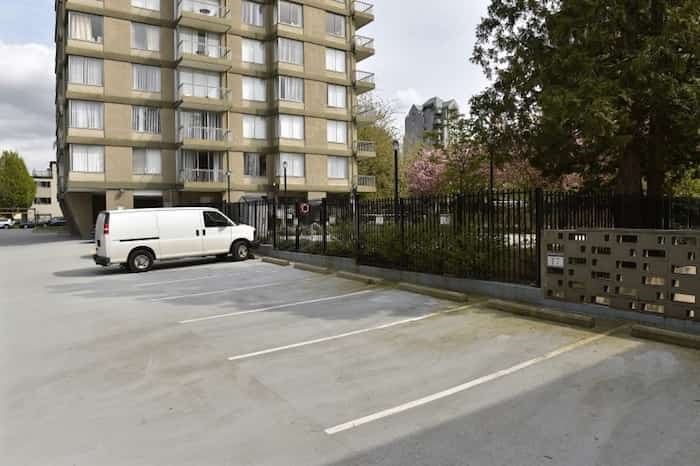 Apartment buildings in Vancouver, including this one at 1305 West 12th Avenue, continue to have empty parking spots. Photo Dan Toulgoet
Apartment buildings in Vancouver, including this one at 1305 West 12th Avenue, continue to have empty parking spots. Photo Dan Toulgoet
Urban planning nerds are going wild this month with all these reports out of city hall and TransLink boasting about walking, biking and transit ridership going up.
If those impressive numbers weren’t intoxicating enough for the active transportation crowd, we also learned Vancouver city staff has come up with “six big moves” to drop carbon emissions by 1.2 million tonnes by the year 2030.
One of those moves is to have two-thirds of trips in Vancouver made by walking, biking or transit. Another move is to have 50 per cent of kilometres driven on Vancouver’s roads to be done in electric vehicles by 2030.
Electric or not, motorists are still going to need somewhere to park, especially as the population of the city and region continues to grow.
Which brings me to another report.
This one is called The 2018 Regional Parking Study, which goes before Metro Vancouver’s housing committee May 1.
Exciting, right?
It kind of is because it concludes what a similar 2012 study did: there continues to be an excessive number of parking spots at apartment buildings in the region that are not being filled up with cars.
Prepared by TransLink and Metro Vancouver, the study looked at 73 sites in the region built between 1976 and 2017, including 14 in Vancouver, 11 in Surrey and seven each in Burnaby and Richmond.
Fifty of the apartments were strata, 12 were market rental, seven mixed tenure, three mixed rental and one non-market rental. The majority—47—were built between 2014 and 2017.
Data was collected generally after 11 p.m. on weeknights. Researchers also quizzed 1,500 residents for contextual information such as vehicle ownership and willingness to forego a parking stall.
What the study found is that parking supply exceeded utilization by 42 per cent at strata buildings. It was 35 per cent at market rental sites and 41 per cent for mixed tenure and mixed rental.
The stats come at a time of a heightened discussion around land use, density and how people are going to get around without the region turning into a Mad Max movie.
Between 2014 and 2018, 59 per cent of the housing unit starts in the region were apartments, followed by 20 per cent single-detached homes, 13 per cent townhouse/duplex/triplex and seven per cent secondary suites.
And with the push from Vancouver and other municipalities for people to seek out other transportation options than the automobile, expect to see fewer parking spots at apartments.
In fact, Metro Vancouver’s 2040 plan calls for just that, particularly around current or future transit hubs and corridors.
Developers will tell you adding parking is costly, takes up space and adds to the price of housing.
The accompanying Metro Vancouver report to the study will tell you this:
“An excessive supply of parking represents an inefficient use of land and capital resources, especially in urban centres and areas along the frequent transit network, and a missed opportunity to reflect evolving transportation choices and to reduce the cost of housing construction.”
That quote is not just the author sounding off, but emphasizing that such data helps inform municipalities’ planning and engineering staff about changes to parking bylaws, rezoning and development reviews, developing area and neighbourhood plans, corridor planning efforts and street parking.
A question that should have been posed and answered up top of this piece is: Why aren’t residents using these parking spots?
The answer comes in many forms, and was verified in the recent reports from the city and TransLink that showed healthy increases in walking, biking and transit use.
The reasons are many: People are unable to afford a car, find owning a car too expensive, have instead joined a car share service, live close to transit, prefer to park their car on the street, parking lot fee is costly, can’t stand congestion and prefer to walk or bike for health and environmental reasons.
Skyrocketing gas prices is another.
But of those strata residents who own one or more vehicles, 83 percent said they need their parking spots.
Which is not surprising.
Only 25 per cent of the same group who don’t own a vehicle said they would forego a parking spot, with 42 per cent unsure and 34 per cent agreeable to losing the spot.
Finally, the study highlights a challenge that remains unchanged from the 2012 study. The design and current capacity of bicycle parking lockers in apartment buildings are discouraging their use by many residents.
The number one reason, by far: “I’m afraid the bike will be stolen or damaged.”
To which the report said: “From a policy and practice perspective, the same care and attention that is paid to accommodating cars and trucks could easily be applied to the provision of convenient, capacious and secure bicycle parking facilities in new apartment developments.”
The full report, with a list of the apartment sites and all the minutiae of the findings can be viewed here. I guarantee you’ll look at parking spots with a keener eye.



